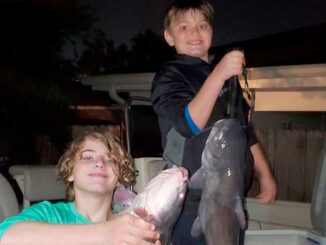
Lyle Johnson chairs the Louisiana Fish Records Program, and spends lots of his spare time targeting Blind River bass. Here’s how he fills the box — and maintains the books.
The hits were explosive — water and pieces of vegetation flew wildly.
Or maybe it was Lyle Johnson’s violent reaction to the hits. He doesn’t like ‘em to get away, and he fusses at himself for every missed fish.
That figures. Johnson is the president of the Louisiana Outdoor Writers Association, and serves as chairman of the Louisiana Fish Records Program, the official repository for the Top 10 records on fish caught by the state’s sportsmen and women.
“Probably 85 percent of my fishing is for bass,” he confessed. “Right here — in the Blind River-Amite Diversion Canal Basin. A lot of people describe Blind River as ‘hard to fish.’ I’m not one of them.
“They come out here one day and fish and their success rate is not good, so they give up. The way to success in anything in the outdoors is to put your time in.”
Lecture complete.
Johnson is close to fishing in his back yard. From his home on the Diversion Canal, he ran south this morning, through a murderer’s row of upscale waterfront homes, and popped out into the green wilderness edging Blind River.
At the river, he hung a left, downstream, and stopped shortly at a slough draining the swamp into the river. The lures he chose for the day were lures that work most effectively in the extremely heavy vegetation of the river: A pointed nose frog and a Strike King Rage Tail Rage Craw.
Johnson’s favored colors for the craw are watermelon red or green pumpkin. His craws were rigged Texas style with a 3/16-ounce head, preferably tungsten because it’s smaller than lead and easier to pull through vegetation without it as much of it collecting on the lure.
He invariably dipped the craw’s claws in chartreuse Spike-It Garlic Dip-N-Glo. “When I finish, you can eat it,” he beamed. “The lure is salt-impregnated, and I added garlic.”
It was mid-summer and promised to be clear and hot, but the early morning sky was hazy. That and the noticeably cleaner water draining down the slough prompted Johnson to start with his frog.
It produced and it produced early, but it was hard weaning him off using the craw. He always pitched his craw instead of casting it.
“It’s so accurate and if you do it right, it makes so little splash when it hits the water,” he explained. “Another advantage to pitching is that it’s less strenuous on the angler.”
He compared it to ball pitching.
“A baseball player throws overhand, but is done for after a few innings. A girls’ softball pitcher pitches underhand and can play every game,” he said.
He developed a routine. As he picked and poked down the bank, he relied on his craw. When he hit a slough, he shifted to the black frog. It worked, but it was making him crazy. Bass would blow up the frog and he’d miss them. When he threw the craw, they ate the claws off over and over.
Lots of them were chubby goggle-eyes, and he caught some of them. But most were largemouths, many 1-pounders he called “normal OK keepers.” But he was quick to add that enough 3 ½- to 4-pound bass are caught from Blind River to be considered “not rare.”
The overcast skies hung on, so Johnson began bouncing from slough to slough to take advantage of the extended topwater bite. Then, at 9:30 a.m. the sun popped out and that action stopped. He was near the mouth of Blind River, where it dumped into Lake Maurepas.
From there, he moved back upriver and took Alligator Bayou, a 2 ½-mile loop off the river’s left bank. “The water tends to be clearer in the bayou and its sloughs run harder,” he said. “Of course, you don’t need a lot of current to catch fish in sloughs.”
The fish bit there too, but Johnson became quiet as morning wore on and time became short. It was like he was quietly soaking in the placid swamp around him.
He didn’t even fuss when he missed a fish.
